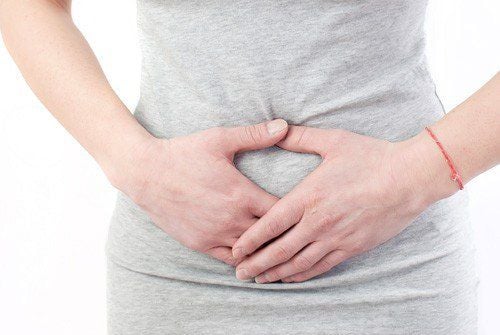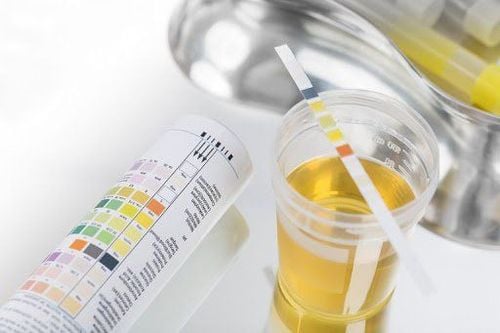This is an automatically translated article.
The article was professionally consulted by Specialist Doctor I Tran Thi Phuong Loan - Obstetrician and Gynecologist - Department of Obstetrics and Gynecology - Vinmec Phu Quoc International General Hospital.Although uncommon, having a baby makes you more susceptible to infections such as postpartum uterine infections, postpartum cervical, vaginal and/or perineal infections, or incisions. Not all postpartum infections are in the pelvic area, they can also occur in the bladder or kidneys if you need a urinary catheter.
1. Causes of uterine infection after cesarean/natural birth
Postpartum infection occurs when bacteria infect the uterus and surrounding areas after a woman gives birth. It is also known as postpartum infection.
It is estimated that 10% of pregnancy-related deaths in the United States are due to infection. Mortality rates are thought to be higher in areas with poor sanitation.
There are several types of uterine infections postpartum, including:
Endometritis : infection of the lining of the uterus Myositis: infection of the uterine muscle Parametritis: infection of the areas around the uterus

Trường hợp bệnh nhân chuyển dạ kéo dài có nhiều khả năng bị nhiễm trùng tử cung
Bacteria that live in the vagina can cause infections after delivery. Conditions that make a woman more likely to get an infection include:
Long time from rupture of membranes to delivery (usually more than 18 hours) Prolonged labor C-section Birth by multiple vaginal exams Medical staff during labor placental fragments left in the uterus after delivery Heavy bleeding after delivery ( postpartum haemorrhage ) Anemia mother Bacterial vaginosis Young mother Low economic family Obesity The development of uterine infection depends mainly on the type of delivery:
Vaginal birth: 1 to 3% C-sections scheduled in advance and performed before labor begins: 5 to 15% cesarean section unscheduled (emergency cesarean delivery) and performed after labor begins: 15 to 20%
2. Manifestations of postpartum uterine infection

Đau ở bụng dưới là triệu chứng thường gặp của nhiễm trùng tử cung
Symptoms of a uterine infection usually include:
Pain in the lower abdomen or pelvis, fever (usually within 1 to 3 days of giving birth), paleness, chills, feeling sick or irritable, and often headaches and loss of appetite. Fast heart beat. The uterus is swollen, tender and painful. Typically, discharge from the vagina has a bad odor in different amounts. The discharge may or may not be bloody. But sometimes the only symptom is a low-grade fever. When the tissues around the uterus become infected, they swell, causing significant discomfort. Women often experience severe pain and high fever. Some serious complications can occur, but are not common, they include the following:
Peritonitis Blood clots in the pelvic veins (pelvic thrombophlebitis) Blood clots that travel to the lungs and cause blockage of an artery in the lungs (pulmonary embolism) High levels in the blood of toxins produced by infectious bacteria, leading to sepsis (systemic infection) or septic shock A pocket of pus (abscess) In the pelvis In sepsis and septic shock, the patient will have symptoms of a sudden drop in blood pressure and a very rapid heart rate. Kidney damage is severe and can even lead to death. These complications are rare, especially when postpartum fever is diagnosed and treated promptly.
3.Diagnosis and treatment of postpartum uterine infection

Xét nghiệm nước tiểu có thể giúp xác định nhiễm trùng đường tiết niệu
Diagnosis of postpartum uterine infection
Uterine infection can be diagnosed mainly based on the results of a physical examination. Sometimes the infection is diagnosed when a woman has a fever for 24 hours after giving birth and no other cause can be identified.
Usually, doctors take a urine sample for examination, analysis ( urinalysis ) and perform a culture and test for bacteria. Urine tests can help identify a urinary tract infection.
Other tests that are rarely needed but may be needed include: culture of a tissue sample taken from the lining of the uterus and certain imaging techniques, usually a computed tomography (CT) scan of the abdomen.
Treatment of postpartum uterine infections
If the uterus becomes infected, women are usually given antibiotics (usually clindamycin and gentamicin) intravenously until the fever is gone for at least 48 hours. After that, most women don't need antibiotics by mouth.
Before a cesarean section, doctors may give you antibiotics right before the surgery. By taking this measure, it will be possible to help prevent infection of the uterus and the area around the uterus.
4.Can postpartum uterine diseases be prevented?
Unsanitary conditions can be a factor in postpartum uterine infection. Postpartum infections occur more often in facilities that do not practice proper medical techniques according to aseptic procedures or where there are insufficient facilities to perform adequate aseptic procedures. . In addition, when healthcare workers lack awareness or sanitation systems fail to meet aseptic practices, a higher rate of infection can result.
The most important risk factor for postpartum infection is the type of birth. If you know you're going to have a cesarean section, you may want to talk to your doctor about the steps the hospital takes to prevent infection. Studies have shown that the following precautions can reduce the risk of postpartum infection during a cesarean section:
Antiseptic bath the morning before a cesarean section Remove pubic hair with a trimmer instead of a knife shaving Use chlorhexidine-alcohol to disinfect the skin Use broad-spectrum antibiotics before surgery Many hospitals have adopted some of these measures to reduce the risk of developing postpartum infections.
Postpartum infection is a common obstetric complication due to many reasons from medical facilities to inadequate infection control procedures, adversely affecting the health and even the life of the mother. . If you notice any abnormal signs, you should go to reputable medical facilities for examination and advice.
Vinmec International General Hospital is a high-quality medical facility in Vietnam with a team of highly qualified medical professionals, well-trained, domestic and foreign, and experienced.
A system of modern and advanced medical equipment, possessing many of the best machines in the world, helping to detect many difficult and dangerous diseases in a short time, supporting the diagnosis and treatment of doctors the most effective. The hospital space is designed according to 5-star hotel standards, giving patients comfort, friendliness and peace of mind.
If you have a need for consultation and examination at Vinmec Hospitals under the nationwide health system, please book an appointment on the website for service.
Please dial HOTLINE for more information or register for an appointment HERE. Download MyVinmec app to make appointments faster and to manage your bookings easily.
References: healthline.com, merckmanuals.com, whattoexpect.com








